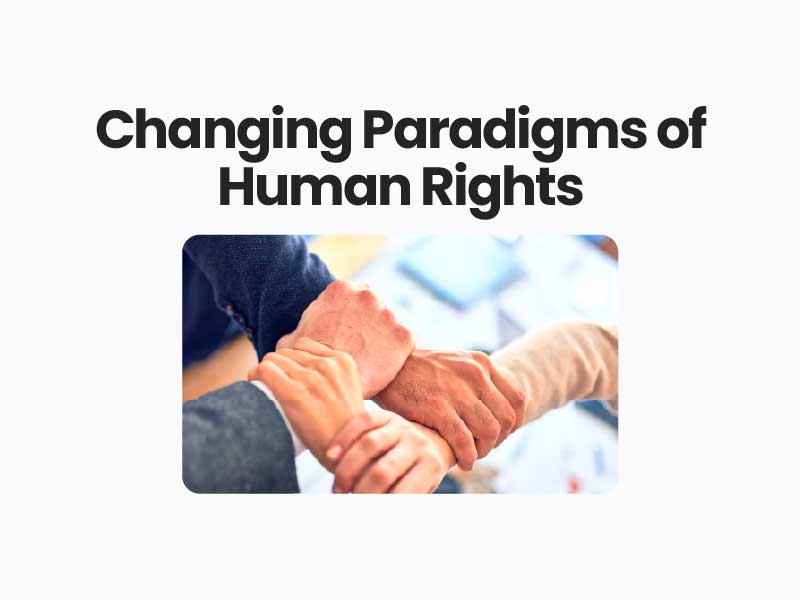Companion@360 → 7 Month programme to sharpen your writing skills → REGISTER NOW

Changing Paradigms of Human Rights
Human rights are the rights a person has simply because he or she is a human being. and are held by all persons equally, universally, and forever. “All human beings are born free and equal in dignity and rights. They are endowed with reason and conscience and should act towards one another in a spirit of brotherhood.
- Different counties ensure these rights in different way. In India they are contained in the Constitution as fundamental rights, i.e. they are guaranteed statutorily. In the UK they are available through precedence, various elements having been laid down by the courts through case law. In addition, international law and conventions also provide certain safeguard
- Basic Requirements for Human Rights – Any society that is to protect human rights must have the following characteristics-
1. A de jure or free state in which the right to self-determination and rule of law exist.
2. A legal system for the protection of human rights.
3. Effective organized (existing within the framework of the state) or unorganized guarantees.
Classification – Human rights have been divided into three categories:
- First generation rights which include civil and political rights.
- Second generation rights such as economic, social and cultural rights.
- Third generation rights such as the right of self-determination and the right to participate in the benefits from mankind’s common heritage.
Approaches To Human Rights:
- The Historical Approach
- The Positivist Approach
- The Marxist Approach
- The Social Science Approach
Universal Declaration :
- The Universal Declaration of Human Rights articulates fundamental rights and freedoms for all. The General Assembly of the United Nations adopted the Declaration on 10 December 1948.
- The Universal Declaration includes civil and political rights, like the right to life, liberty, free speech and privacy. It also includes economic, social and cultural rights, like the right to social security, health and education.
- The Universal Declaration is not a treaty, so it does not directly create legal obligations for countries.
- However, it is an expression of the fundamental values which are shared by all members of the international community. And it has had a profound influence on the development of international human rights law. Some argue that because countries have consistently invoked the Declaration for more than sixty years, it has become binding as a part of customary international law.
- Further, the Universal Declaration has given rise to a range of other international agreements which are legally binding on the countries that ratify them. These include:
- the International Covenant on Civil and Political Rights (ICCPR) and
- the International Covenant on Economic, Social and Cultural Rights (ICESCR).
Issues:
- It is not the state but the international community that is meant to safeguard third generation rights, accountability is impossible to guarantee.
- It is not the state but the international community that is meant to safeguard third generation rights, accountability is impossible to guarantee.
Conclusion:
The efficacy of the mechanisms in place today has been questioned in the light of blatant human rights violations and disregard for basic human dignity in nearly all countries in one or more forms. In many cases, those who are to blame cannot be brought to book because of political considerations, power equations etc. When such violations are allowed to go unchecked, they often increase in frequency and intensity usually because perpetrators feel that they enjoy immunity from punishment.
